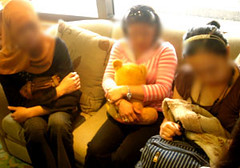Human Trafficking Guide

Human trafficking can involve the following methods: •
Prostitution and sexual exploitation – Prostitution is one of the biggest problems when it comes to human trafficking. Women traded in this manner may not even be aware of where they are headed to. Most of them are promised domestic jobs, only to find themselves sold on the streets. •
Forced labor, servitude and slavery – This is also a very common practice in the trafficking of human beings. Victims are forced to work against their will and without just compensation. •
Organ market – The organ market has rapidly grown over the last decade. It has become a common underground practice for wealthy foreigners to buy organs. Victims willingly give up their organs for cash. They are paid a very small percentage of what the middleman actually gets. Other human trafficking methods usually involve the trade of children. Some of these methods are: illegal international adoption, children trafficked and traded into early marriage. Others are recruited as beggars and street sellers. Some are sold to cults and underground sports arenas.
Click here for more A Manila-based ring is trafficking Filipino workers to the Bahamas via Cuba, and has yet to be stopped despite having made at least four such trafficking attempts since 2008, the Department of Foreign Affairs (DFA) said on Thursday. The DFA said the information came from the Filipino Association in the Bahamas, which alerted the Philippine Embassy there of the ring’s operations. Citing a report from the Philippine Embassy, the DFA said the association named the alleged leader of the illegal recruiters as a certain Leonid "Ned" Pascual. It also identified one of his partners as one Pascuala "Peachy" Ramos. “Pascual is implicated in previous cases of human trafficking and is currently in Cuba’s immigration blacklist," it said on its website (www.dfa.gov.ph). “His group had attempted to bring in Filipinos, disguised as tourists, to the Bahamas via Havana four times since 2008. Recently, they attempted to bring in seven Filipinos," it added. The DFA said Cuban authorities learned of two attempts made in July 2008 and April 2009 when the victims were left stranded in Havana. At least two other attempts, made in December 2008 and January 2009, managed to bring the Filipinos to the Bahamas. However, Pascual and his gang abandoned the Filipinos and left them without any job or lodgings. The Philippine Embassy assisted the stranded Filipinos by providing them with food and accommodation and facilitated their return to the Philippines. Also, the Philippine Embassy reported that the Bahamanian Embassy in Havana is aware of this modus operandi by the Manila-based recruiters and will turn down visa applications of suspicious applicants. “Cuban immigration authorities have indicated that they will apprehend and incarcerate anyone who violated their laws," the DFA said. The Philippine Embassy urged Filipino jobseekers not to deal with Pascual and Ramos, and instead report them and their cohorts to police authorities. It said the National Bureau of Investigation and the Task Force Against Illegal Recruitment headed by Vice President Manuel “Noli" de Castro Jr. are investigating the matter. The DFA reiterated its warning to the public to be wary of recruiters promising lucrative employment opportunities abroad and to first verify such opportunities with the Philippine Overseas Employment Administration to avoid being victimized. A
recent report of the Bureau of Immigration disclosed that of nearly 5,000 travelers barred from leaving the country during the first half of 2009, most were suspected victims of human trafficking and illegal recruitment syndicates. Some were prevented from leaving due to improper or incomplete travel documents. Of the total, a third or 1,236 of them were Filipinos suspected of being “tourist workers" or undocumented overseas Filipino workers (OFWs) disguised as tourists, said Immigration Commissioner Marcelino Libanan.
- GMANews.TV 





